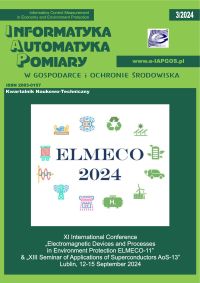NOWY, AUTOMATYCZNY SYSTEM KONTROLI OBCIĄŻENIA SŁONECZNEGO OPARTY NA SZTUCZNEJ INTELIGENCJI
Kudith Nageswara Rao
Hindustan Institute of Technology and Science, Department of Electrical and Electronics Engineering (Indie)
http://orcid.org/0000-0003-4490-0900
Ganesamoorthy Rajkuma
raj06@ymail.comHindustan Institute of Technology and Science, Department of Electrical and Electronics Engineering (Indie)
http://orcid.org/0000-0002-6505-892X
Abstrakt
W dzisiejszych czasach panele słoneczne stały się powszechnym widokiem w wielu gospodarstwach domowych, ponieważ zapewniają energię elektryczną do różnych celów. Zazwyczaj panele słoneczne ładują akumulator, a nadmiar wytworzonej energii jest zwykle marnowany po pełnym naładowaniu akumulatora. Jednakże, wykorzystując tę dodatkową energię, można również zasilać duże obciążenia. W tym miejscu do gry wkracza kontroler energii słonecznej, który mierzy parametry ogniwa słonecznego za pomocą wielu czujników i odpowiednio dostosowuje obciążenie. Gdy moc wyjściowa ogniwa fotowoltaicznego jest wysoka, obciążenie jest zasilane energią słoneczną, a jeśli moc nie jest wystarczająca, obciążenie przełącza się na główne źródło zasilania. Obciążenie przełącza się z powrotem na zasilanie energią słoneczną, gdy jej moc ponownie staje się wysoka. Monitorowanie parametrów ogniwa fotowoltaicznego pozwala na identyfikację mocy wytwarzanej przez panel fotowoltaiczny w czasie rzeczywistym.
Słowa kluczowe:
system kontroli obciążenia, panel słonecznyBibliografia
Dabou R. et al.: Development of autonomous monitoring and performance evaluation system of grid-tied photovoltaic station. International Journal of Hydrogen Energy 46(59), 2021, 30267–30287.
DOI: https://doi.org/10.1016/j.ijhydene.2021.06.204
Google Scholar
Dini H. S., Rizki P. P.: Automation and mobile phone based-monitoring of hydroponic farming style using solar energy. Acta Electron. Malays. (AEM) 5(5), 2021.
Google Scholar
Ergashevich K. K. et al.: Wsn-based Monitoring Systems for the Solar Power Stations of Telecommunication Devices. IIUM Engineering Journal 22(2), 2021, 98–118.
DOI: https://doi.org/10.31436/iiumej.v22i2.1464
Google Scholar
Gallego A. J. et al.: Model Predictive Control of the Mojave solar trough plants. Control Engineering Practice 123, 2022, 105140.
DOI: https://doi.org/10.1016/j.conengprac.2022.105140
Google Scholar
Ganesamoorthy R., Sekar S.: An improved intermittent power supply technique for electrostatic precipitators. Energy Harvesting and Systems, 2022.
DOI: https://doi.org/10.1515/ehs-2022-0047
Google Scholar
Hu S. et al.: Disguised Tailing and Video Surveillance With Solar-Powered Fixed-Wing Unmanned Aerial Vehicle. IEEE Transactions on Vehicular Technology 71(5), 2022, 5507–5518.
DOI: https://doi.org/10.1109/TVT.2022.3157705
Google Scholar
Imtiaz A. et al.: Grid-Assisted Rooftop Solar PV System: A Step toward Green Medina, KSA. Smart Science 7(2), 2019, 130–138, [http://doi.org/10.1080/23080477.2019.1565053].
DOI: https://doi.org/10.1080/23080477.2019.1565053
Google Scholar
Jino R. et al.: A self-powered, real-time, LoRaWAN IoT-based soil health monitoring system. IEEE Internet of Things Journal 8(11), 2021, 9278–9293.
DOI: https://doi.org/10.1109/JIOT.2021.3056586
Google Scholar
Kandeal A. W. et al.: Infrared thermography-based condition monitoring of solar photovoltaic systems: A mini review of recent advances. Solar Energy 223, 2021, 33–43.
DOI: https://doi.org/10.1016/j.solener.2021.05.032
Google Scholar
Karthik B., Priyanka Gandhi M.: Solar powered based DC drives controlled by using IoT. Materials Today: Proceedings 37, 2021, 2513–2516.
DOI: https://doi.org/10.1016/j.matpr.2020.08.317
Google Scholar
Kerem A., Abdusselam Y.: Design and prototyping of GSM-bluetooth based solar energy remote monitoring system. COMPEL-The international journal for computation and mathematics in electrical and electronic engineering, 2021.
DOI: https://doi.org/10.1108/COMPEL-10-2021-0384
Google Scholar
Kotb M. et al.: Enriching the stability of solar/wind DC microgrids using battery and superconducting magnetic energy storage based fuzzy logic control. Journal of Energy Storage 45, 2022, 103751.
DOI: https://doi.org/10.1016/j.est.2021.103751
Google Scholar
Liu J. et al.: Domain size control in all-polymer solar cells. Iscience 25(4), 2022, 104090.
DOI: https://doi.org/10.1016/j.isci.2022.104090
Google Scholar
Rajkumar G., Ajna K. I.: Design and Performance Evaluation of Efficiency Enhanced Solar Food Processor. Smart Science 10(4), 2022, 283–293, [http://doi.org/10.1080/23080477.2021.2012009].
DOI: https://doi.org/10.1080/23080477.2021.2012009
Google Scholar
Shakya S.: A self monitoring and analyzing system for solar power station using IoT and data mining algorithms. Journal of Soft Computing Paradigm 3(2), 2021, 96–109.
DOI: https://doi.org/10.36548/jscp.2021.2.004
Google Scholar
Trevathan J. et al.: An IoT general-purpose sensor board for enabling remote aquatic environmental monitoring. Internet of Things 16, 2021, 100429.
DOI: https://doi.org/10.1016/j.iot.2021.100429
Google Scholar
Wahyu S. et al.: Efficiency Testing Of Solar-Powered Smart Green House Systems For Plant Culture. Jurnal Teknik Elektro dan Komputer 11(1), 2022, 9–14.
DOI: https://doi.org/10.35793/jtek.11.1.2022.36933
Google Scholar
Zhou K. et al.: Morphology control in high‐efficiency all‐polymer solar cells. InfoMat 4(4), 2022, e12270.
DOI: https://doi.org/10.1002/inf2.12270
Google Scholar
Autorzy
Kudith Nageswara RaoHindustan Institute of Technology and Science, Department of Electrical and Electronics Engineering Indie
http://orcid.org/0000-0003-4490-0900
Autorzy
Ganesamoorthy Rajkumaraj06@ymail.com
Hindustan Institute of Technology and Science, Department of Electrical and Electronics Engineering Indie
http://orcid.org/0000-0002-6505-892X
Statystyki
Abstract views: 95PDF downloads: 92
Licencja

Utwór dostępny jest na licencji Creative Commons Uznanie autorstwa – Na tych samych warunkach 4.0 Miedzynarodowe.
Inne teksty tego samego autora
- Kudith Nageswara Rao, Ganesamoorthy Rajkuma, CHŁODZENIE PANELI FOTOWOLTAICZNYCH Z WYKORZYSTANIEM EFEKTU STOSU , Informatyka, Automatyka, Pomiary w Gospodarce i Ochronie Środowiska: Tom 13 Nr 3 (2023)








